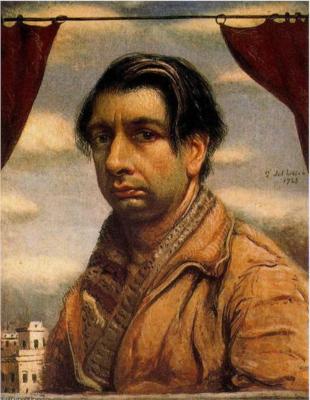
The founder of the Metaphysical art movement, Giorgio de Chirico (1888-1978) was an Italian (Born in Volos,Greece)surrealist painter, whose work implied a metaphysical questioning of reality. He studied in Athens and Florence, then moved to Germany to continue his studies at the Academy of Fine Arts in Munich. There he was influenced by the writings of Nietzsche and Arthur Schopenhauer. On his way to Paris, De Chirico traveled back to Florence and later to Turin, where he was moved by the metaphysical beauty of the surroundings. Why suddenly de Chirico?
On his way to Paris, De Chirico traveled back to Florence and later to Turin, where he was moved by the metaphysical beauty of the surroundings. Why suddenly de Chirico?
 Paintings of all major periods of de Chirico’s creative life will be exhibited: both metaphysical and post-metaphysical painting, as well as early canvases. Russian art lovers, Muscovites particularly, suddenly became newly excited about de Chirico, and art bloggers reacted accordingly.
Paintings of all major periods of de Chirico’s creative life will be exhibited: both metaphysical and post-metaphysical painting, as well as early canvases. Russian art lovers, Muscovites particularly, suddenly became newly excited about de Chirico, and art bloggers reacted accordingly.
 In the opinion of one blogger, the artist anticipated the further development of historical events in his paintings, as often the case with true visionaries. Her favorites are de Chirico’s landscapes, and her views, however controversial, seemed to me interesting enough to share, loosely translated from Russian.
In the opinion of one blogger, the artist anticipated the further development of historical events in his paintings, as often the case with true visionaries. Her favorites are de Chirico’s landscapes, and her views, however controversial, seemed to me interesting enough to share, loosely translated from Russian.
His [De Chirico’s] landscape is the Imperial Rome with its greatness, power, brutality and… boredom — an ideal depiction of totalitarianism.
After all, she notes, up to the middle of the 20th century, Italy dreamt about the revival of Roman imperial greatness. Nazi dictator Mussolini was the product of this dream. However, nothing of consequence happened: Italians got a few hefty slaps in the face and, for a time being, forgot their ambitious plans of revival of the Roman Empire. Today’s typical Italian is an elderly person who enjoys comfort, preserves his health and tranquillity. He isn’t in a hurry to exchange his convenience and the opportunity to live past 80 on such illusory benefit as greatness of his country.
Today’s typical Italian is an elderly person who enjoys comfort, preserves his health and tranquillity. He isn’t in a hurry to exchange his convenience and the opportunity to live past 80 on such illusory benefit as greatness of his country.

Giorgio de Chirico. Self-portrait.
Today’s Russian abandoned his dreams of Cosmos and communism. He wants to become what the Italian has become already. His prevalent idea of spending the rest of his life is simple and unburdened by existential questions. It all boils down to growing old, slowly — oh, so slowly — enjoying his own garden somewhere in the warm climes. Not everybody can afford such luxury these days, however. Who will provide such luxury for him? This is yet another existential question, to which there is no answer in de Chirico’s ladscapes.
